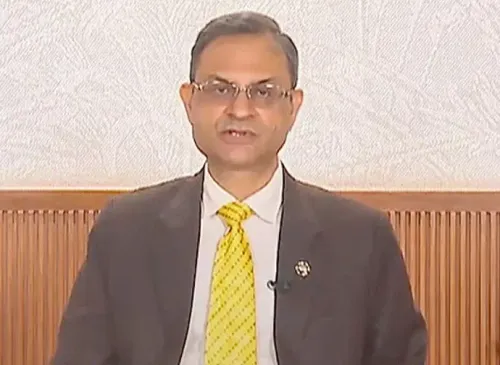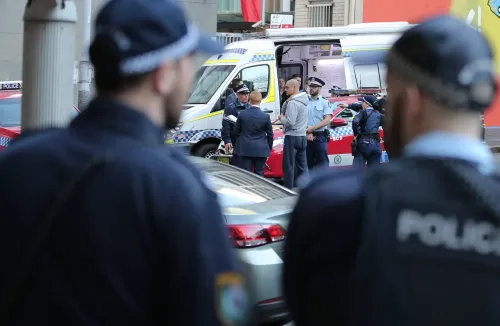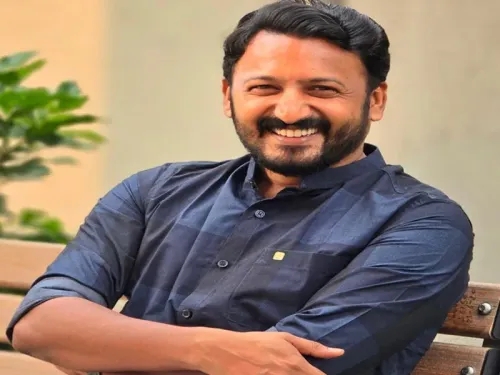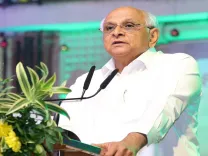Is South Korean President Warning About Risks of Accidental Clash with North Korea While Vowing to Resume Dialogue?
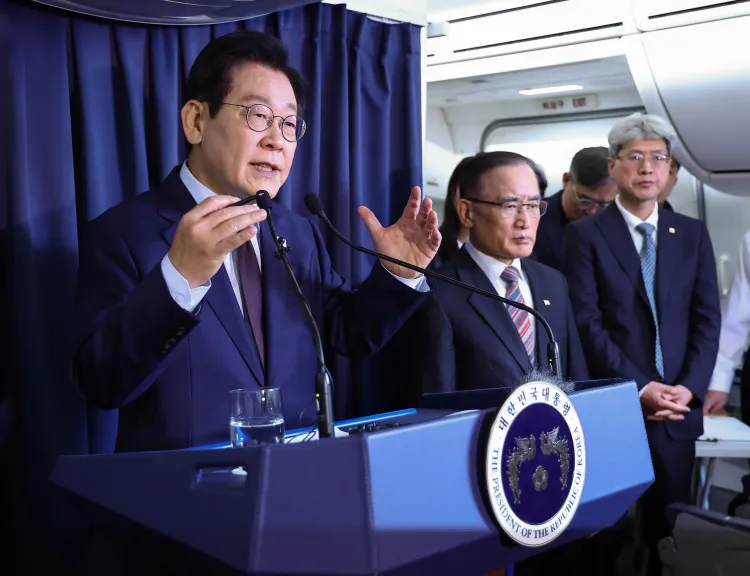
Synopsis
Key Takeaways
- Lee Jae Myung warns of potential accidental clashes with North Korea.
- Emphasizes the need for patient efforts for dialogue.
- Calls for military talks to clarify the Military Demarcation Line.
- Severed communication channels pose risks for conflict resolution.
- South Korea's ultimate goal is peaceful unification.
Ankara, Nov 24 (NationPress) South Korean President Lee Jae Myung has expressed concern over the potential for accidental clashes with North Korea, emphasizing that Seoul must maintain efforts to patiently foster dialogue with Pyongyang to mitigate such risks.
Lee shared his insights on inter-Korean relations during a press briefing aboard his flight from Johannesburg to Ankara, as part of his four-nation tour of Africa and the Middle East, according to the Yonhap News Agency on Monday.
"Relations between the two Koreas have become exceedingly hostile and confrontational, with North Korea engaging in extreme actions devoid of basic trust," Lee informed reporters. "We find ourselves in a precarious situation where accidental clashes could erupt at any moment."
He reiterated his appeal for dialogue after Seoul proposed military discussions to clarify the Military Demarcation Line (MDL), aimed at averting unintended clashes near the border. This proposal arose amidst recurrent incidents of North Korean soldiers briefly crossing the MDL while clearing land or laying mines in the buffer zone.
Lee pointed out that the North has begun erecting triple layers of barbed wire along the MDL, increasing the likelihood of warning-fire incidents due to differing interpretations of the precise border line.
"With all communication avenues severed, even if an accidental clash were to occur, resolution would be impossible," he articulated.
To alleviate tensions on the Korean Peninsula, Lee stressed the importance of pursuing dialogue with Pyongyang, even if it remains unresponsive.
While reaffirming that unification with North Korea is South Korea's ultimate goal, Lee stated that it must be approached from a long-term perspective.
"We have no intention of seeking unification through absorption," he clarified, underscoring that discussions on unification should only follow the resumption of dialogue and the establishment of peaceful coexistence.
When asked if South Korea might consider scaling back its joint military exercises with the United States to encourage negotiations with Pyongyang, Lee remarked that it is premature to reach conclusions, labeling the issue as "the most sensitive matter" for North Korea.
He expressed that while a stable peace regime that eliminates the necessity for large-scale exercises would be ideal in the long term, decisions regarding drills should be contingent on evolving circumstances.
"If a stable peace regime is firmly established between the Koreas, refraining from conducting drills would be ideal," he noted. "Depending on the situation, reducing or postponing the exercises could either stem from building a peace regime or serve as leverage to facilitate one. It is challenging to ascertain which outcome will occur at this moment."
North Korea has historically condemned the Seoul-Washington drills as "war rehearsals," while the allies maintain they are defensive in nature.
On relations with China, Lee reiterated that South Korea must manage its ties with its largest trading partner stably while advancing its alliance with the US to a strategic comprehensive one encompassing economic and technological aspects.
"The foundation of our diplomatic efforts is the Korea-US alliance, while maintaining stable relations with China," he stated. "This approach is grounded in pragmatic diplomacy focused on national interests. I have clearly communicated this principle to both the US and China."
Regarding the diplomatic tensions between Beijing and Tokyo following remarks by Japanese Prime Minister Sanae Takaichi about Taiwan, Lee advocated for a "cool-headed approach" driven by national interest.
He mentioned that he held discussions with Takaichi and Chinese Premier Li Qiang at the Group of 20 (G20) summit in South Africa to prevent misunderstandings or conflicts.
"I have clarified our position in both meetings," he stated, adding that "there are no additional risk factors" in South Korea's relations with neighboring nations.
South Korea, China, and Japan reportedly held consultations to arrange their first trilateral summit since May 2024. However, the outlook for trilateral engagement remains uncertain amid the diplomatic dispute between Tokyo and Beijing.
Lee noted that leaders he met during the G20 summit in South Africa and visits to the United Arab Emirates (UAE) and Egypt exhibited keen interest in South Korea's defense industry.
"They expressed particular interest in joint development, production, sales, and exploring new markets," he said.
He conveyed optimism about securing a significant defense deal from the UAE following his summit with President Mohamed bin Zayed Al Nahyan last week.
Lee also mentioned that Egyptian President Abdel Fattah El-Sisi outlined plans to expand Cairo International Airport, estimating the cost at around 3-4 trillion won (USD 2-2.7 billion), expressing hope that Korean companies would participate in the project.
In Johannesburg, Indian Prime Minister Narendra Modi proposed establishing a collaborative framework in the shipbuilding industry involving South Korea, Japan, and India, Lee noted.
Ahead of his summit with Turkish President Recep Tayyip Erdogan on Monday, Lee expressed his intention to showcase Korea's advanced nuclear energy capabilities to promote the state-run Korea Electric Power Corp. (KEPCO)'s bid for a new nuclear plant project in Turkey.
In 2023, KEPCO submitted a preliminary bid for Turkey's second nuclear power plant project in Sinop on the Black Sea coast.

